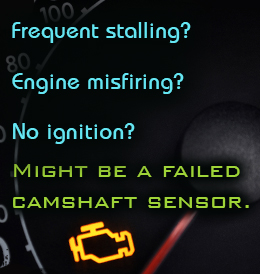
Did You Know?
Replacement of the camshaft position sensor was rated as one of the top 25 most common engine repairs in the US in 2013 by CarMD’s Vehicle Health Index.In a distributor-less engine, the distributor is replaced by a camshaft position sensor. The camshaft uses lobes called ‘cams’ to push open the valves of the engine, which then return to their original positions via a spring action. The sensor sends information of the piston position to the car control module, which then adjusts the rate of firing of the spark plug and fuel injection, to improve engine function.
The location of the camshaft position sensor depends on the brand, but mostly, it is in the car hood beside the engine. More precisely, it is found on a housing, over the timing cover on the camshaft gears. A bad sensor can adversely affect the driving performance of the vehicle, due to incorrect signals being transmitted to the car module.
Camshaft Position Sensor Failure
Probable Causes
► High temperature and humidity
► Accident
► Wear and tear
► Interference in signal due to
- dirt and oil/engine fluid leak
- poor electrical connection
- weak battery
- open or shorted sensor harness
- electromagnetic interference (EMI) from parts like the alternate diode
- secondary ignition
- engine grounding
- collection of magnetic particles on sensor tip
- stretched timing belts or chains
- damaged wiring
- cracked flex plate
- high end play of camshaft
Indicative Signs
► Malfunction indicator lamp
The ‘check engine’ light on the car control module may go on, indicating that something is wrong with the engine. The driver needs to get it serviced sooner than later, thus avoiding further disruptions.
► Reduced driving performance
- Frequent stalling after traveling some distance due to incorrect firing.
- Poor idling of the engine with struggling sounds.
- Engine failure on accelerating may occur, since fuel is delivered haphazardly due to lack of sensor control on pistons, or engine cylinders are not fired in correct sequence.
- The user may experience rough running on a regular basis.
- Increased engine vibration.
- Lessened gas mileage.
- Reduction in the number of revolutions per minute of the engine.
- Frequent slowing down of the vehicle.
- Taking a long time to start.
- Engine sputtering (misfire) as the combustion is being blown through the exhaust, since the firing order of cylinders is mismatched.
- Loss of power.
- Over time, the poor acceleration due to sensor failure will worsen as other engine components bear the brunt.
- Long cranking time during cold starting of the engine.
► Lack of ignition
There may be no ignition, as the car’s computer does not receive a signal from the sensor, because of which the spark plug does not function. This is usually observed when the earlier symptoms are ignored.
As far as the camshaft position sensor is concerned, the earlier you spot the signs, the better. Keep an eye out for the above warning signs, and rest assured, the sensor is not something you will need to worry about.